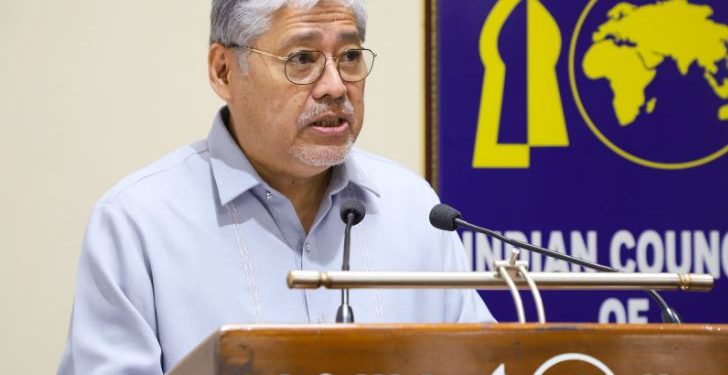New Delhi: The Philippines wants to develop a “very robust” defence partnership with India and is looking forward to procuring military hardware from it, Filipino Foreign Secretary Enrique A Manalo said Wednesday amid concerns in Manila over China’s increasing military muscle-flexing in the South China Sea.
Delivering a lecture at a leading think tank here a day ahead of his talks with External Affairs Minister S Jaishankar, Manalo said his country has “repeatedly” challenged Chinese presence in the exclusive economic zones (EEZs) of the Philippines in the South China Sea and will continue to do so.
The Filipino foreign secretary, on a four-day visit to India, said the 10 ASEAN (Association of Southeast Asian Nations) countries and China have been engaged to formulate a code of conduct (CoC) for the South China Sea, but he appeared unsure about a positive outcome.
The code is envisioned to prevent any military conflict in the South China Sea, a region that has overlapping territorial claims by China, Taiwan, Philippines, Vietnam, Malaysia and Brunei
“We may not be seeing the light at the end of the tunnel but we see the tunnel,” he said in an address at the Indian Council of World Affairs (ICWA).
Describing India as a key partner of the Philippines, Manalo said Manila wants to expand the bilateral cooperation in areas of maritime security, cyber-terrorism, education, healthcare and climate technologies among others.
The defence and security ties between India and the Philippines are on an upswing. In January last year, the Philippines concluded a $ 375 million deal with India for the procurement of three batteries of the BrahMos cruise missile.
“We hope to develop very robust defence cooperation arrangements with India. We have already entered into some potential deals and I think we will be looking forward to having more,” he said when asked whether his country is looking at procuring more military hardware from India.
“We certainly view our defence partnership with India as one of the brighter aspects of our mutual relationship. I am not talking about the distant future but in the near term,” the secretary of foreign affairs of the Philippines said.
Manalo will hold wide-ranging talks with Jaishankar Thursday, covering the entire gamut of bilateral relations.
In March last year, India signed a framework agreement with the Philippines that provided for government-to-government deals for the supply of defence hardware and equipment.
Manalo said Chinese presence in EEZs of the Philippines is a “major challenge” in his country’s relationship with China.
There have been growing global concerns over China’s sweeping claims of sovereignty over all of the South China Sea, a huge source of hydrocarbons. Several countries in the region including Vietnam, the Philippines and Brunei, have counterclaims.
“We have almost on a daily basis made our concerns clear to China but at the same time let me stress that the differences we have with China in the South China Sea are not the sum total of our relations with China. We have a significant bilateral engagement with China,” he added.
India too has significant economic stakes in the South China Sea and it has been calling for adherence to global norms and resolution of the disputes through dialogue in the region.
On the code of conduct for the South China Sea, the visiting diplomat said the ASEAN countries will have to decide whether it will be legally binding or not. At the same time, he said China and ASEAN nations are all committed to finalising the code.
“This is a negotiation between 10 ASEAN countries and China. So you can imagine the complexities involved in the talks,” he said.
On the Indo-Pacific, Manalo said the ASEAN wants the region to be open and inclusive.
PTI






































